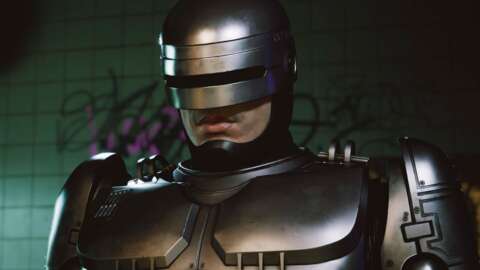RoboCop: Rogue City is a love letter to the 36-year-old sci-fi franchise. Teyon, the studio behind Terminator: Resistance and Rambo: The Video Game, clearly has a soft spot for ’80s action movies, and this reverence is woven into the very fabric of Rogue City’s design. From the environments to the soundtrack to the satirical style, it captures the look, sound, and vibe of the first two RoboCop movies with exceptional aplomb, while also making you feel like you’re fully embodying the titular supercop. Pistons whir with each heavy footstep of your titanium frame as you shrug off damage and methodically dispatch criminal scum with the lethal precision of a machine. There’s something admirable about this adherence to authenticity, yet being a near-unstoppable force doesn’t always make for the most compelling video game. Rogue City often appears as though it’s stuck at a crossroads between being faithful to the source material and presenting an enjoyable first-person shooter, and it only sometimes strikes a satisfying balance.
Rogue City’s story feels genuine by etching a brand-new tale into the series’ familiar narrative framework, but this is another area where Teyon sometimes sticks too closely to the original two movies’ vision. Set between the events of RoboCop 2 and RoboCop 3, Rogue City sees you play as Old Detroit cop Alex Murphy–with Peter Weller reprising the famous role–who’s been rebuilt as the cyborg RoboCop after being fatally wounded in the line of duty. The game opens with a satirical news segment that would feel right at home in Paul Verhoeven’s 1987 film, establishing the crime-riddled state of Old Detroit. Nuke, the highly addictive designer drug introduced in RoboCop 2, is still proliferating on the streets, and now there’s a new crime boss in town who has the rest of the city’s gangs lining up to work for him. Putting a stop to this new wave of crime is your prime directive, but the story also explores a number of sub-plots with mixed results.
At the conclusion of the game’s first mission, for instance, RoboCop malfunctions in a dangerous hostage situation and begins having flashbacks to the life he used to have as a loving husband and father. Mega-corporation Omni Consumer Products (OCP) is eager to fix its faulty hardware, even going as far as to hire a therapist for RoboCop to talk to. The original movies explored themes of control and free will and touched on the dichotomy of RoboCop’s very existence, but these moments were often clumsily handled and never reached a particularly satisfying conclusion. Rogue City allows you to delve deeper into Murphy’s psyche by choosing various dialogue options during your mandated therapy sessions. You can toe the line and say you’re just a machine or that it doesn’t matter either way, or you can opt to dig further and explore Murphy’s relationship with his humanity and personal identity. There are some interesting moments that arise from these conversations and the way your answers influence how others perceive you, but it also doesn’t say anything we haven’t heard before, either within RoboCop’s own fiction or in other media. As a result, Rogue City feels like it’s simply retreading old ground and falling into the same pitfalls the movies once did.
